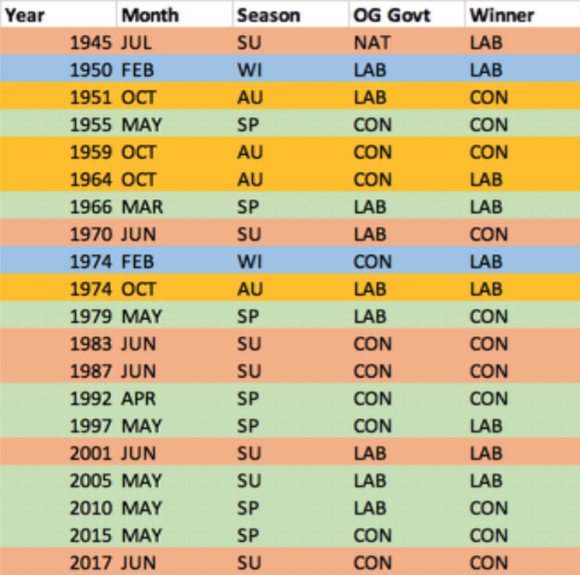In recent weeks there has been a lot of speculation about a looming crisis in Parliament. There could, the whispers suggest, be no majority for any Brexit option, which might lead to a winter General Election.
Let’s leave aside for a moment the thorny issue of how such an election might be triggered and look at what it might mean. Were there to be an election, Theresa May would doubtless be hoping that she could gain a majority.
There is a widely-held myth that “winter” General Elections are bad for Labour. The reasoning goes that ‘working people’ are less likely to turn out to vote in the dark, cold, winter months whereas middle-class Tories are more likely to.
Is it true? The record suggests otherwise. There have only been two winter General Elections since 1945: 23rd February 1950, and 28th February 1974. There have been four autumn General Elections, held in October: 1951, 1959, 1964 and 1974.
In the two proper “winter” elections—1950 and 1974—Labour won.
In the four October elections—to which the above ‘weather’ conditions might apply—Labour won two and the Conservatives won two. Labour also won the only March general election: in 1966.

It would take a bit more detailed digging into the meteorological record to see if the weather made any real difference, but it would very likely be hard to establish any real pattern.
And, of course, the length of the daylight doesn’t vary from winter to winter.
The myth that “winter elections are bad for Labour” is just that: a myth.
So where does that leave us with regards to us 2018?
The data shows that there is also an obvious pattern in the dates of General Elections since 1945: there have been none in November, December or January.
We can clearly exclude a January election as a possibility: there is no way it could happen without the campaign starting before, and extending over, Christmas. No politician in their right minds would do that. (Yes, I know, it sometimes seems at the moment anything is possible—but Turkeys, Christmas, really?)
So, we are clearly too late now for one in October. But could it happen in November or even December?
It seems very unlikely. The Brexit crisis is unlikely to come to full-on meltdown until after the November EU summit, by which it will be too late to call an election before Christmas.
Of course, it is possible the crisis within the Tory Party could explode (implode?) earlier than November—but the window for a pre-Christmas General Election is closing fast.
So realistically—if that is the right word—if a Winter General Election was coming it would likely be in February, following a political crisis within the Tory Party before Christmas.
Which would mean Brexit negotiations would also probably come to a halt before Christmas—and the UK hurtling towards Brexit in April without a deal or a Government.
In that case, winter really would be coming.












